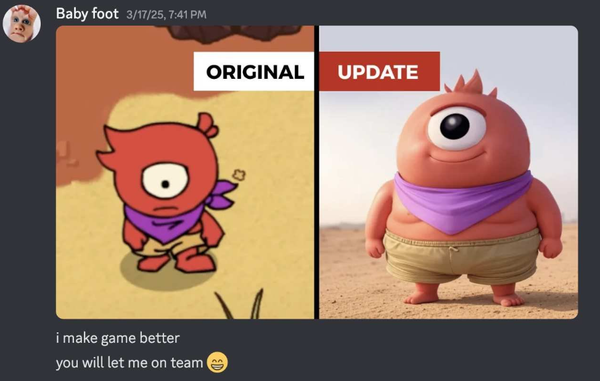Good night, sweet slurp juice prince
Also: a church for the hyper-online, the latest from Aphex Twin's mega-noggin, and 6 other cultural artifacts worth knowing about

EX is a research report about contemporary culture. This week: Odd Church, bad Spider Man deepfakes, a potential future for ChatGPT in games, and more.
1. A Fortnite star retires
In a 40-minute video titled “Goodbye…”, Fortnite star Turner “Tfue” Tenney announced that he is either retiring or taking a break. By the standards of YouTube, where creators often choose titles like “Goodbye 😢” to get more eyeballs on an upload announcing that they’re saying “goodbye” to their old house, Tfue’s self-memorial video is pretty earnest. In addition to a statement that he “needs time to get away” from streaming burnout, there’s a career retrospective that includes some notable prehistoric clips from his Destiny and H1Z1 days before a long stretch of Fortnite highlights and an unseemly number of clips showing triumphs over his old rival Ninja. That fits: beyond his skill at the game, Tfue’s appeal was that he was a more “real,” profane, and sometimes toxic alternative to brand-safe kids’ creators.
2. Odd Church
If you're Christian, looking for a creatively inclined community, and would be interested in listening to ebullient prog music made by Jay Tholen, the mind behind Hypnospace Outlaw, we have just the Discord server for you.
This isn't an ad, but it isn't snark, either. None of us are Christian, but we can sympathize with how difficult it must be to find likeminded Christians in an online social culture that continues to become more atomized and polarized every day. Tholen started Odd Church in 2020 "for Christ followers who wish to connect with other Christ followers who have niche interests or weird creative pursuits."
Paradoxically, Odd Church's YouTube channel — which mostly seems to serve as a showcase for Tholen's music and its accompanying visuals — proves that it can take broadcasting one's most intimate and esoteric creative self in order to find genuine community.
3. Aphex Twin sends new dispatches from Aphex Twinverse
Aphex Twin has announced a new EP via a characteristically obtuse augmented reality game. A week ago his official account tweeted notice of “something special” at a festival’s merch booth; posters with QR codes lead to an app called YXBoZXh0d2lu (currently boasting nine 5-star ratings on the App Store!); those same QR codes viewed through the app lead to a small snippet of music, which turns out to be the meditative synth line of his new single (and EP title track) “Blackbox Life Recorder 21f.” This is all par for the course for the trickster god of electronic music, who once hid his own face in the sine waves of a record. Since his 2013 comeback LP Syro — which was announced via cryptic graffiti, ominous blimp, and legendarily doofy press release — he’s leaned into these playful leaps between infosphere and biosphere, even minting an NFT (sigh) in 2021 before donating its proceeds to permaculture. Perhaps this is all to compensate for the increasingly listener-friendly music, full of bone-rattling boom-bap and playful synth experiments. The new “Blackbox Life Recorder 21f” sounds like a field trip through his inimitable catalog, decades of innovation morphing measure by measure into the fog.
4. “Narrative AI” platform Hidden Door holds great potential, terror
Artificial intelligence has been a going concern in the videogame industry for decades, as has the potential for algorithmic storytelling (see: Dwarf Fortress, Wildermyth, No Man’s Sky). But a company called Hidden Door is aiming to wield the new generation of generative AI tech like ChatGPT to create a fundamentally new type of videogame, in which imaginative tabletop role-playing scenarios can be explored on a whim. Like its more handcrafted predecessor Storyteller, Hidden Door’s games rely on traditional storytelling tropes (MacGuffins, bar brawls, romances). But, unlike Storyteller, which had a very limited set of actions players could take, Hidden Door’s games let users type each action in via open text field. Theoretically, anything’s possible. The company’s first product will be based on the public-domain Land Of Oz, but they have aspirations to do licensed work within canons, as well as original, created universes. Still, anyone who has watched what happened to poor Sydney knows exactly how things will go here: the gaming public will seek only to break Hidden Door’s system and force the kindly fantasy denizens into a Boschian garden of depravity. People of Oz: brace yourselves. The gamers are coming.
5. Spreadsheets in space

There’s a worn-out old joke that the MMO Eve Online is “spreadsheets in space.” For players, the game’s massive starship battles often boil down to sorting and right-clicking enemy names in a targeting table; elsewhere traders and industry-focused players spend much of their time tracking prices and sorting assets with third-party tools; and the UI itself is a mess of text-rich sheets.
Now developer CCP Games has closed the circle and added real Excel support to Eve Online. Cashing in on this well-known joke has been an earned media coup that led to coverage on all the big games sites. Companies like Blizzard used to stockpile user jokes like these for April Fool’s Day gags; everyone hates that now, but they seem to love being surprised by the same grade of gag when it’s rolled out at a random time.
6. Only Up

This week YouTube, Twitch, and Tiktok were inundated with clips of streamers raging at Only Up!, one of those games only streamers play. It’s a 3D clone of Getting Over It with Bennett Foddy, an absurdist mountain-climbing game that became a huge streaming hit back in 2017. Getting Over It had clever narration and evident glee in its placement of devilish obstacles — and also many crushing moments where you fell a long way, which streamers used to scream and act out and throw their chairs. Only Up! looks sort of like an artless, NFT-strewn update of Getting Over It, but it’s all focused on recreating that perfect clippable falling moment for streamers.
Its main innovation is the illusion of a giant cityscape sprawling below the junk mountain you climb. Seeing the skyscrapers far below the streamer’s feet come rushing back up is a far better stomach-drop moment for the audience than the scrolling scenery in Getting Over It or similar rage favorite Jump King.
7. Fan theory: Bad Spider-Man deepfake anticipates end of MCU??
This fake deepfake — we’ll explain — of Spider-Man: No Way Home has been making the rounds again. It originally surfaced a month before the release of the movie, which famously cobbled together Tobey Maguire, Andrew Garfield, and Tom Holland in a multiverse-spanning mashup. The video is so poorly deepfaked — with Tobey Maguire emerging as if from heaven to intone the timeless phrase, “I’m Spider-Man” — and its cinema verite touches are so hamfisted that the video has become an apotheosis of bad deepfake videos, intentionally or otherwise. (Seems intentional, though.) Anyway, it all feels newly relevant given the way Warner Bros. crammed every human living or dead who ever played a DC superhero into an attempt to make “the Flash” happen. Our question: If the multiverse trend signals superhero exhaustion, what comes next?
8. El Paso, Elsewhere
El Paso, Elsewhere, a Max Payne-inspired game in which you perform slow-motion gun tangoes with vampires and werewolves, got a promising Steam demo this past week. In addition to "bullet time" dodge rolls and dually wielded handguns, El Paso, Elsewhere has stark, colorful lighting and the kind of neo noir voiceover that's delivered in a litany of sentence fragments. From its first set of jump cuts, it's clear that El Paso, Elsewhere is intentional about the artistry behind every element of its storytelling.
As we continue to hurtle towards a strange and uncertain future, game developers continue to burrow restlessly into the past. Over the past few years, reimaginations of '90s- and '00s-inspired first- and third-person shooter classics have answered a longing for the "gamefeels" of bygone eras. El Paso, Elsewhere doesn't shy away from making its inspirations clear — a section of the Steam demo description says the game is "a vivid slow motion love letter to action classics" — but also balances "retro" aesthetics against contemporary cinematic ideas.
That’s it for this week. Hit reply if you want to hire us.






